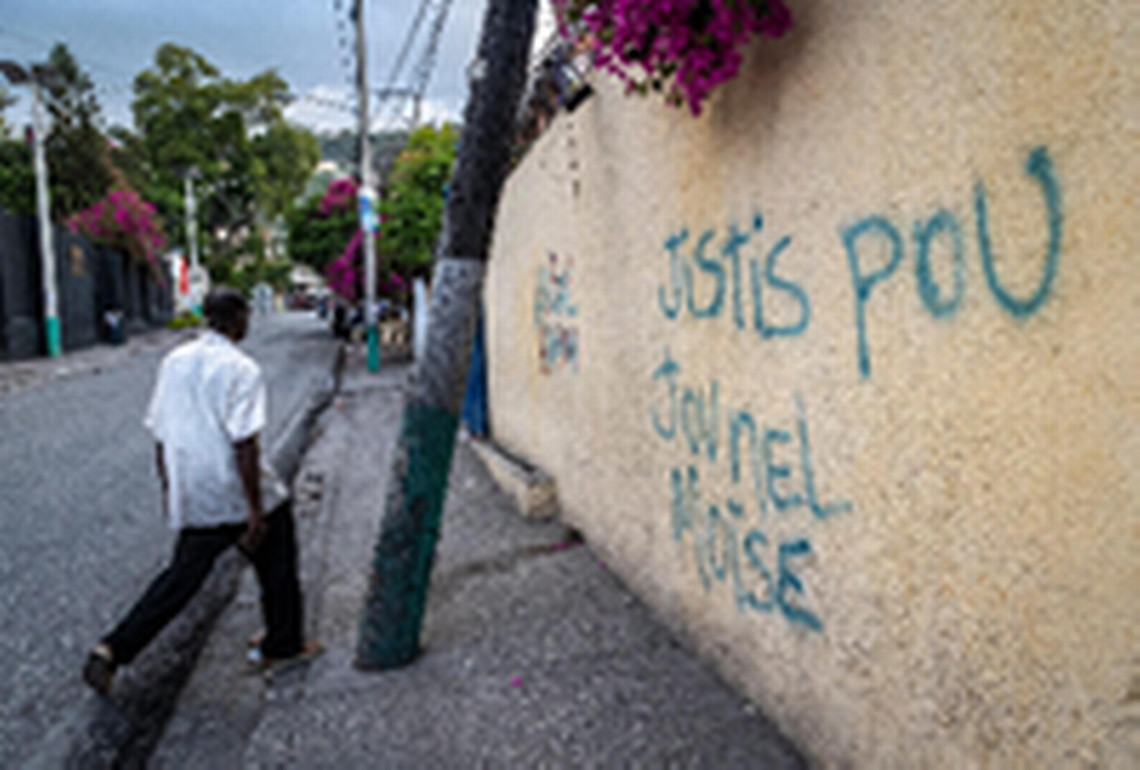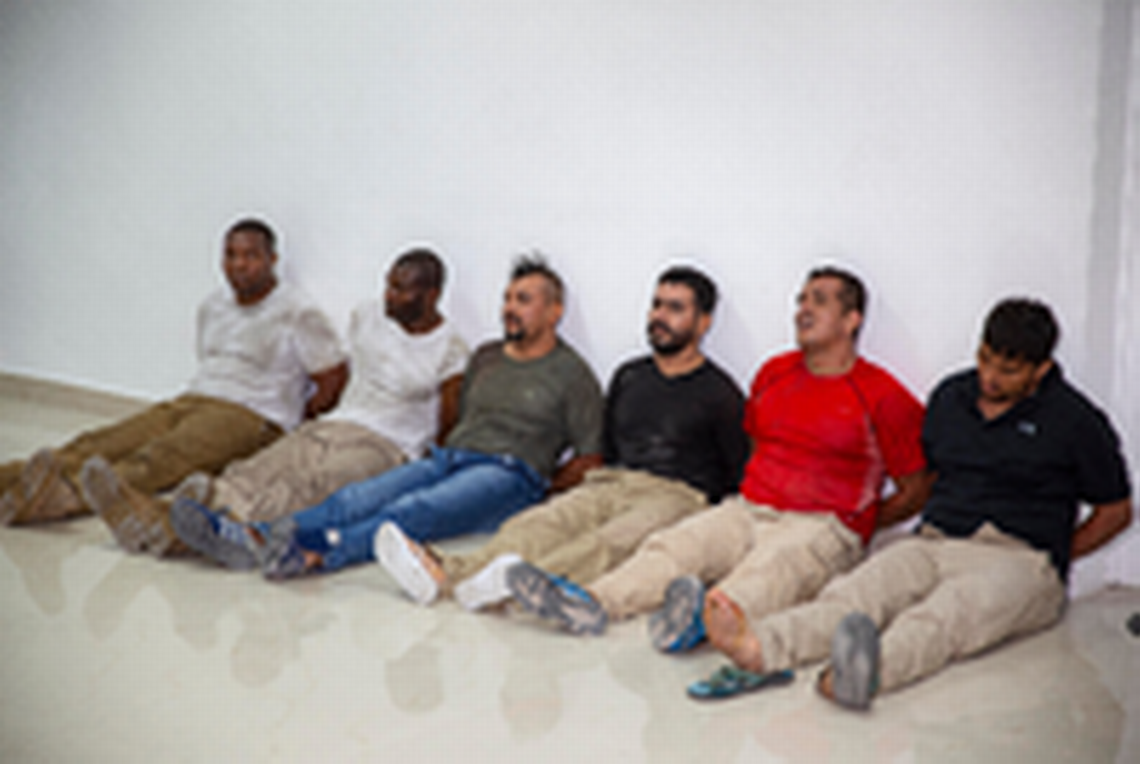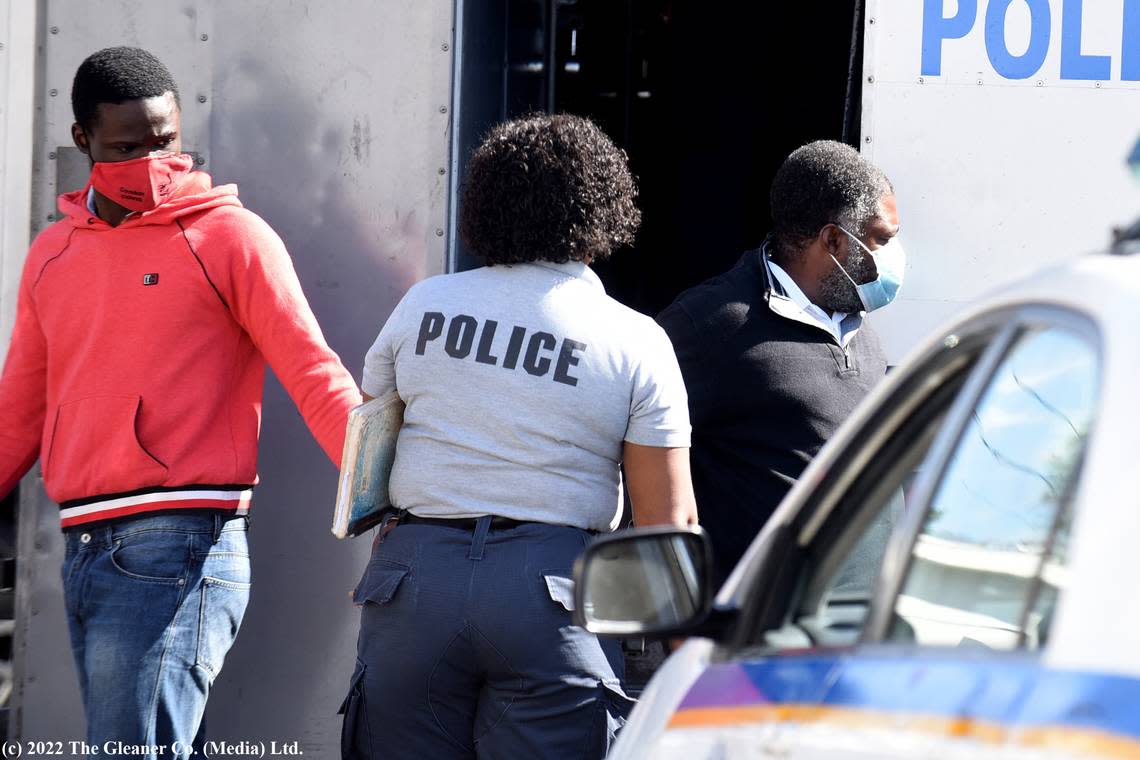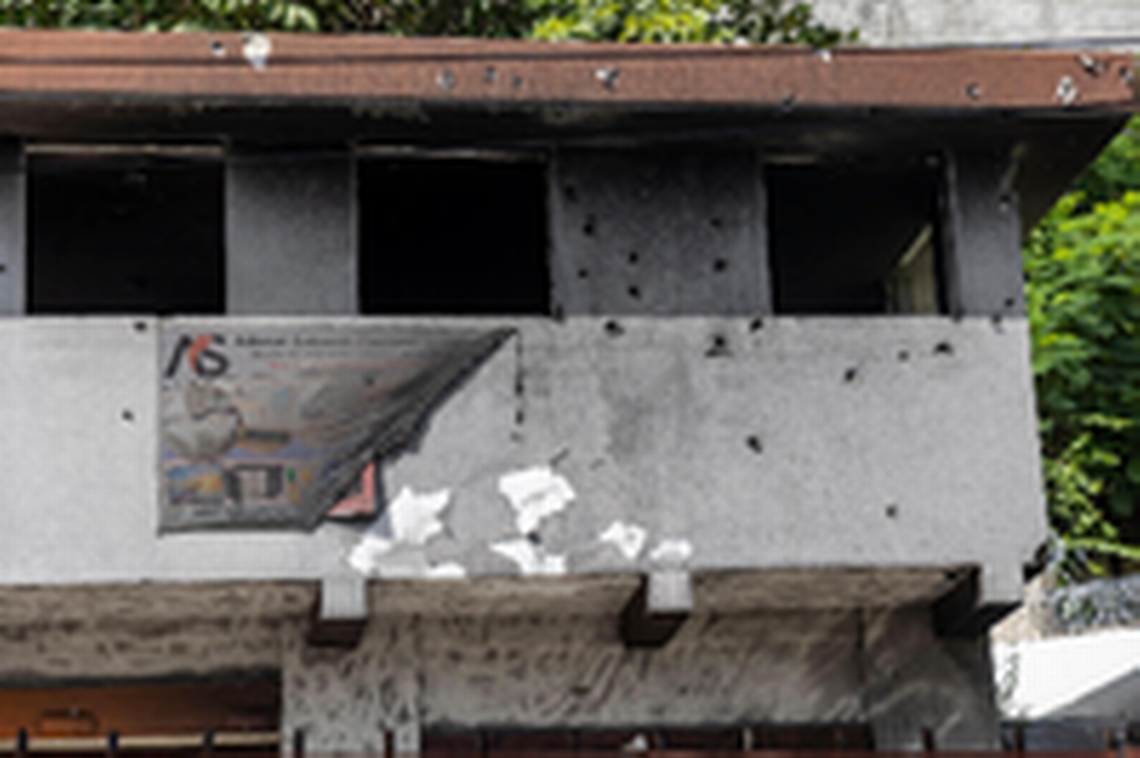Accused of killing Haiti President Jovenel Moïse, Colombian ex-soldier breaks his silence
Retired Sgt. Edwin Blanquicet Rodríguez had spent 20 years in the Colombian military when he received an offer: Travel to Haiti as part of a security team to protect a politician and guard electrical infrastructure projects.
Blanquicet, looking for a way to support his family, took the job.
Weeks after arriving in Port-au-Prince in June of last year, however, he found himself fighting for his life. He and a team of other Colombian former soldiers got an order to leave their client — an evangelical preacher who wanted to be president — and head to a house in the hills of Port-au-Prince. The ordeal ended in the assassination of the country’s president, and hours later Blanquicet found himself pleading his innocence before an angry mob.
“I begged for my life,” Blanquicet recalled in an interview on Colombian radio station La FM, breaking his silence on the slaying with fresh details that raise more questions in the slow-moving investigation into the assassination of Haitian President Jovenel Moïse.
“I told them that we were innocent, and they didn’t pay attention to me, and they kept striking me with their machetes,” he said.
A year after Moïse was shot to death inside his private bedroom, those accused of his assassination have yet to be brought to trial or even be formally charged in Haiti, and Blanquicet’s account is raising questions about the events surrounding the killing.
Blanquicet is among a group of former Colombian soldiers who Haitian and U.S. authorities say accompanied Haitian police officers and two Haitian Americans to storm Moïse’s private residence in the middle of the night on July 7, 2021, and shot him a dozen times. Moïse’s wife, Martine, who was also shot, survived the attack.

Three of the 22 former soldiers who have been publicly identified are dead, including the man Blanquicet says recruited him for the Haiti security job, Duberney Capador, on behalf of a Miami-area security firm, Counter Terrorist Unit Federal Academy. One former soldier, Mario Antonio Palacios Palacios, is in custody in Miami, where he has been charged in a murder conspiracy indictment. The remaining 18 soldiers are being detained in a Haitian prison, where a recently leaked video shows inmates decrying the lack of food and water.
The tangled plot involved active and former Haitian police officers, including members of Moïse’s own security team, and three Haitian Americans with ties to South Florida, including the evangelical preacher and physician Emmanuel Christian Sanon. In the months leading up to the assassination, Sanon had allegedly held meetings with the opposition about replacing Moïse as the president — an accusation he denied in a recent Miami Herald interview.
According to Haitian police and Herald interviews, Sanon hired the Colombian former soldiers as bodyguards to protect him while he was in Haiti.
Haitian police said that Sanon told them that a firm based in Doral, Florida, CTU Security, actually recruited the Colombians and was supposed “to pay the mercenaries” $10,000 a month. (Haitian police have accused CTU Security of training the Colombians. They also claim that a Broward company, Worldwide Capital Lending Group, provided funds to pay for that training, though the company’s owner, Walter Veintemilla, who lives in Weston, has denied involvement in or knowledge of an assassination plot through his lawyer, Robert Nicholson.)
During the radio interview Blanquicet made several references to “bosses” ordering him to abandon Sanon and later trying to negotiate his surrender, but he never names them.
Revelations raise more questions
Blanquicet said he has given his version of events to the FBI, which is running a parallel investigation, and to the Haitian judicial police, which has accused him and 41 others currently jailed in Haiti of involvement in the assassination.
Among Blanquicet’s claims: The Colombians did not arrive at the president’s house until around 2 a.m., which is an hour after Haitian police said the president had been killed.

While there has been debate about the actual timing of the president’s death, a Haitian official with knowledge of the investigation says police stand by their report of the Colombians’ involvement in the assassination.
“We among ourselves concluded that the president was killed by his own bodyguards,” Blanquicet told the Colombian radio station. “We didn’t come to this country with the intention of killing anyone. We came into the country with the intention and the illusion of finding work for a better future for our families.”
A year later
A year after Moïse’s killing, his death remains an international whodunit. While the U.S. investigation has already resulted in criminal charges against three suspects being held in federal lockup in Miami, the Haiti investigation is stalled. After a turn-over of investigative judges, a fifth judge named to oversee the investigation only resumed the case this week, and a key suspect, former government official Joseph Félix Badio, remains a fugitive.
Two Colombia-based advocates representing the accused soldiers and their families say the detainees have been abandoned in an overcrowded and decrepit Haitian prison and are being used “as scapegoats.”
Both advocates, Lorena Lazaro and Jose Espinosa, along with New York-based Colombian lawyer Sondra Macollins Garvin, are pushing to have the former soldiers transferred to a third country, where they say they would have a better chance at pleading their innocence. They have all reached out to the Inter-American Commission of Human Rights at the Organization of American States for assistance. The commission told the Herald it does not provide information on pending matters.
Garvin said families of the jailed soldiers plan to protest Thursday in front of the vice president’s office in Bogotá demanding their release.
Lazaro points to Blanquicet’s interview as evidence that not all has been revealed about the plot, and a more thorough investigation is needed.
According to the Haitian police investigation, after the assassination, Blanquicet was discovered by Haitians in the area of Jalousie, a nearby mountaintop slum in the heart of Petionville, not far from the president’s residence, and handed over to the police, along with two other soldiers.
Blanquicet said he was attacked with machetes by the Haitians who found him. He said he suffers from tuberculosis and stress as a result of his imprisonment in the national penitentiary in Port-au-Prince.
He said his own government in Colombia has abandoned them, “when some of us have served the country for more than 20 years.”
Haitian cops, weapons distribution
Hours before the president’s death, Blanquicet said in the radio interview, he and the other former Colombian soldiers were watching Colombia lose to Argentina in a soccer match. Shortly after the game ended, he said, the phone rang at the house where Blanquicet was guarding Sanon.
It was his “boss,” Blanquicet said, telling him “to get ready with my team because an official from the Haitian national police would come by to pick me up and that I was to accompany him.”
Soon after, a pickup truck driven by a Haitian police officer arrived at the house. “We got into the pickup truck and were taken to a house in the hills,” Blanquicet said.
The house was located in Pèlerin, the same hillside community in the Petionville suburb where the president lived.
The house belonged to Rodolphe Jaar, a local businessman who held both Chilean and Haitian citizenship and was a one-time informant for the U.S. Drug Enforcement Administration before he was convicted of cocaine trafficking in Miami. An FBI criminal complaint charges Jaar with providing material support resulting in Moïse’s death, and conspiring to kill or kidnap him. In an interview with FBI agents, while in hiding in Haiti, Jaar admitted that “he provided firearms and ammunition to the Colombians to support the assassination operation.”
Jaar also stated that the operation changed from arresting Moïse and flying him out of the country “to an assassination.”
Jaar also admitted to helping some of the suspects accused of killing Moïse hide in the aftermath, according to the FBI criminal complaint and affidavit.
At Jaar’s house there were other Haitian police officers, Blanquicet said, and guns were distributed, though he insisted his team did not receive any weapons.

He said the group headed to the president’s house around 2 a.m. in a seven-car motorcade accompanied by Haitian police officers.
“We were told that we had to provide security for the policemen while they captured the president because, according to them, they had an arrest order against the president,” Blanquicet said.
Before reaching Moïse’s house, he said, they came across two roadblocks manned by the president’s security inside his neighborhood.
“When the first of our vehicles, driven by police officials, reached them, [the security staff] dove to the ground. I thought it was strange that they did so without making any type of resistance or raising an alarm,” he said.
Blanquicet said policemen were left guarding the captured security guards and the convoy continued to head up the mountain road.
“When we reached the second checkpoint, the men there did the same and dove to the ground, and we began commenting among ourselves about the strangeness of the situation. Some of us were uneasy,” Blanquicet said.

When the group reached the parking lot of the president’s house they found no guards, he said. He went to a house next door to observe Moïse’s house while the others in the team were trying to pry open a side door on the president’s house around 2:15 to 2:30 a.m., he said.
Blanquicet didn’t provide a description of the neighboring house, but according to Haitian police, one of the suspects who remain on the run, Badio, had rented a home nearby to spy on Moïse’s comings and goings.
From the neighboring house Blanquicet said, he initially could not see anything. Then he looked up at the second floor of the president’s private residence and saw “gunshot flashes” coming from a back room.
“I jumped down because I thought they were firing at me,” he said. “Our men outside also heard the shots and began to fire back. I saw four men dressed like us who left the presidential house through the back door.”
‘The president is dead’
Blanquicet said two teams of Colombians entered the house, while two stayed outside with him.
One Colombian who entered the house “saw the two bodies and immediately yelled, ‘The president is dead, the president is dead. Let’s get out of here, they laid a trap for us,’ ” Blanquicet said.
He said he and his group spent the next 36 hours trying to survive and to get their hands on evidence — a video recording on a DVD — that he said proved the Colombian team had left Jaar’s house after Moïse had already been killed. He said the former soldiers found the video at Jaar’s house.
“We kept the video recordings and it proves our innocence, because the forensic examination shows that the president was killed at 1 a.m., and the video shows we arrived around 2 a.m.”
Haitian police attack, evidence goes up in smoke
After leaving the house, the former soldiers continued to drive around the Petionville area but were unable to go far because of a blockade by Haitian police.
Some soldiers sought cover in a roadside drainage canal, where their standoff captured on video was shared on social media. Others ended up at a two-story concrete building nearby in Pèlerin 2 and engaged in a a bloody shootout with police.
“We took defensive positions and we remained there for hours while our bosses tried to negotiate our surrender,” Blanquicet said. ”But they did not really want us to surrender. They wanted us dead. We spent all day there.”
Blanquicet doesn’t say who his “bosses” were. But right around this time, James Solages and Joseph Vincent, two Haitian Americans who had been part of the convoy that went to Moïse’s house, were negotiating their surrender to the Haitian police.
The two men eventually turned themselves in to police, claiming that they were translators. A police source said that after Solages and Vincent gave themselves up, police believed that the Colombians would no longer surrender and were waiting for someone to come extricate them. The source said members of the presidential guard wanted to kill the Colombians, and that other Haitian police officers mounted an assault to capture the Colombians alive.
Blanquicet disagreed. He said the police arrived in armored vehicles and began an assault with machine guns, snipers and grenades in order to kill them.
He said during the assault, police set fire to a white pickup truck, sending everything up in flames. Blanquicet said the DVD evidence that would have proven the former soldiers had not left Jaar’s house until after the president had been assassinated burned as well.
“During the assault some in our groups raised their hands to give up, but then more shots were fired at them. That’s when we understood that what they wanted was to kill us and blame us once we were dead,” he said.
Police ended up killing three of the Colombians during the assault, including Capador, and arrested five former soldiers afterward. Some of the Colombians ran up the hill and took refuge in the Taiwanese embassy. Eleven of the suspects were eventually arrested inside the embassy while others managed to escape. Blanquicet, who was among the latter, was finally captured two days after the assassination. By then they had been found by angry Haitians.
“The population was irate after the police chief incited the people, telling them that we were mercenaries and that we had to be hunted down, like if we were game in a safari,” Blanquicet said.
Blanquicet said the police put out false information to make the former soldiers appear like they were the assassins. After they were captured, he said, some of the Colombians were pressured by police to provide incriminating evidence.
“Some of us were wounded, especially me, and kept begging to be taken to the infirmary,” he said. “In the middle of the night, men wearing masks would come in and take some of us. They would return around 3 or 4 in the morning. The men would return crying, beaten, with their fingernails torn out. The next day they would be peeing blood. ... They were terrified and wouldn’t want to talk to us.”
Blanquicet said the men in the group he was with were badly injured and that the nightly beatings continued for days.
“At the time we were all wishing for the day to never end,” he said, “because we knew they would come back at night and they would take people away to be tortured.”
Miami Herald staff writer Jay Weaver contributed to this report.
